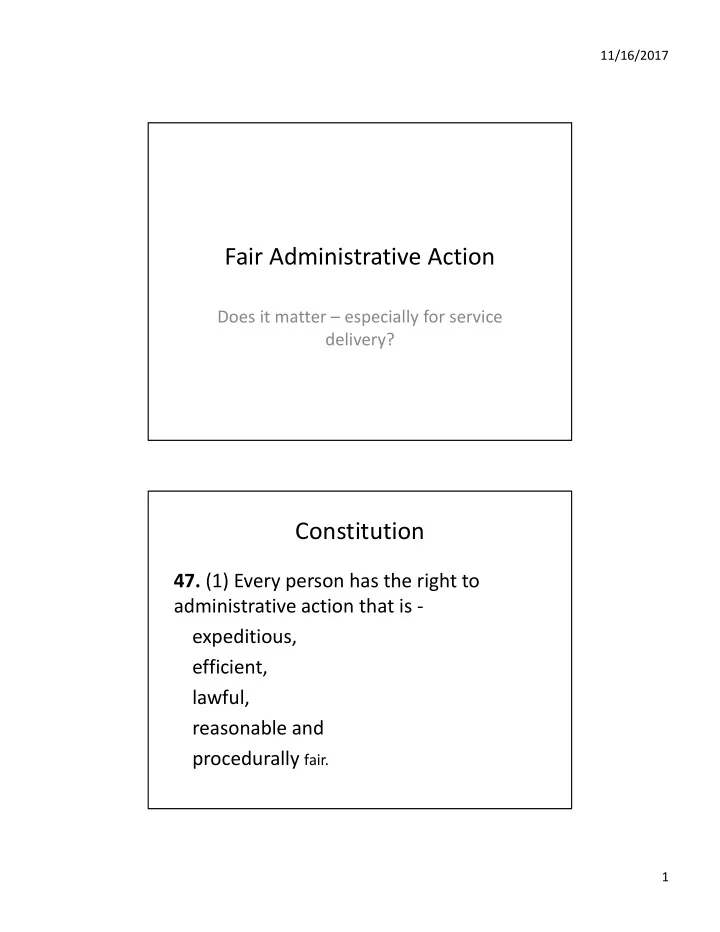

11/16/2017 Fair Administrative Action Does it matter – especially for service delivery? Constitution 47. (1) Every person has the right to administrative action that is - expeditious, efficient, lawful, reasonable and procedurally fair. 1
11/16/2017 Main promise • Towards a fairer society • Deepens democracy • Strengthens accountability “Daily interactions that citizens have with bureaucrats in many African countries are often fraught with delays broken promises, extortion and abuse of power.” - Migai Akech Where does it come from? • Has a history in the prevention of government abuse of power over the centuries • But is not limited to “you have no power to do that under the law” • Built on ideas developed for courts and applied them to many public decision making contexts – And even to private bodies that affect people’s lives and livelihoods • We picked it up from South Africa’s Constitution • But have further expanded it 2
11/16/2017 How does it relate to the delivery of services? • Licencing • Water • Education • Health • Sanitation • Agricultural services • Lighting • Roads Highlights • Administrative action must be: – Legal – Procedurally fair – Rational (or reasonable) • Now it must also: – Respect constitutional values – Including human rights 3
11/16/2017 Legality • The right person (or body) • With the power • Depends on the notion that a conscious decision is made to give a power to a person because of their expertise etc. • If the person is not right or the power is not there – A court will send it back to the decision maker – do it right this time! Procedural Follow the procedure in the law • Consider each case • Give a fair hearing to anyone affected • – Tell them what is happening and what factors will affect the decision – Give them enough time – Listen to what they say Give them reasons for the final decision • Treat them in a way that respects rights • – E.g dignity Consultation and public participation • No unreasonable delay • Efficient • 4
11/16/2017 Factors affecting the actual decision • Bear in mind the purpose of the power • Take the right factors into consideration • And not the wrong factors – Including do not discriminate on the basis of personal characteristics • Don’t be irrational • If affecting rights, ensure that this is proportional to the aims to be achieved • If (lawful) promises have been made, respect the expectations they give rise to. • Public interest does not automatically trump personal interests How is it working? • Dominance of wealthy and middle class interests in the cases – Potential lawyers not admitted to the Kenya School of Law – Professional disciplinary hearings – Challenging revocation of land titles – Demolition of buildings – Destruction of advertising hoardings – Refusal of liquor licences – Citizenship for foreign spouses 5
11/16/2017 Have been a few more about wananchi • Challenging evictions – Of roadside nursery in Westlands – Of hawkers in Mombasa – From housing • Challenging expulsion from school What is the potential? • Speedy decisions • Based on public input • Based on the needs of those affected • Based on evidence and rational thinking • Not discriminatory • BUT – – Most useful for situations where there is a service but it is poor and decisions are defective – And for the wealthier 6
11/16/2017 So • To deal with the absence of services, needs to work in conjunction with Article 43 – Right to health, education, housing, food, sanitation, water and social security • Maybe the Ombudsman is a better route for the ordinary citizen? 7
Recommend
More recommend